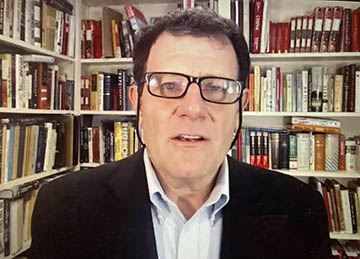by Jas Sarna, School of Arts and Sciences and SAS Honors Program Scholar, Class of 2024
On November 17, 2020, Rutgers University’s Bloustein School, School of Communication and Information, and School of Social Work co-sponsored a virtual panel discussion regarding the ranking of the United States on the Social Progress Index.
The Social Progress Index was inspired by the research of Nobel-winning economists and is meant to complement economic measures of countries’ success by measuring 50 metrics of well-being divided into three major categories: basic human needs, foundations of well-being, and opportunity. The metrics include nutrition, safety, freedom, the environment, health, education, inclusiveness, shelter, and more, and are used to measure the quality of life in 163 countries. It provides the structure for measuring multiple dimensions of social progress, evaluating success, and prompts greater human well-being. Based on data newly released in September 2020, the United States is one of only three countries to have moved down in rank from 19th in 2011 to 28th now, indicating a decrease in quality of life.
The discussion focused on the specific metrics in which the United States scored the lowest, the structural problems that contributed to that score, and how public affairs currently may exacerbate the decline of well-being in America. The expert panelists featured in this conversation were Nicholas D. Kristof, New York Times columnist and two-time Pulitzer Prize winner; Juan D. Gonzalez, professor of professional practice, journalism and media studies, School of Communication and Information, Rutgers University; Lenna Nepomnyaschy, associate professor, School of Social Work, Rutgers University; and Clinton Andrews, Professor and Associate Dean for Research, Bloustein School. Bloustein School Dean Vonu Thakuriah opened the event, welcomed participants, and provided an introduction of Mr. Kristof.

Mr. Kristof began the conversation with a description of his hometown of Yamhill, Oregon, and how he would return after traveling the world and witnessing humanitarian crises, just to see people being neglected in his own town. Mr. Kristof explained “deaths of despair” as deaths resulting from drug overdose, suicide, and alcoholic liver disease, commonly seen in groups that had bleak outlooks on their future social and economic situations. He said that he believed America brushes these deaths off without truly recognizing them as the issue that they are. These deaths and their causes deserve more attention, and the Social Progress Index provides a tool to compare situations between countries to identify what led to these lost lives.
The conversation then shifted specifically to talking about the United States’ position on the index and overall negative progress over the last nine years. Mr. Kristof showed concern that we were one of the only countries to move down in ranking and that the other two were struggling with authoritarian governments and “blustering leadership.” He pointed out that even within this small group of countries doing worse than before, America had also gone backward by the greatest increment, emphasizing the problem with America’s social progress and quality of life. While speaking, Mr. Kristof made a point out of how the United States is ranked highly and has strong performance in some metrics, but is very low in others; specific examples included having great health technology, but low access to health care; and having some of the best universities in the world, but a lack of quality basic education.
In trying to explain why the quality of life has gone down in the United States, Mr. Kristof expressed that he believes the U.S. puts too much emphasis on people’s individual responsibility and choices, rather than society as a whole, and that this has led to a lack of political will to instill certain policies that would improve the country. He referenced his neighbors in Oregon and how they made bad choices, but how the system also let them down by not dealing with the domestic violence issue in the home or the school being happy when the “troublemaker” kids dropped out of school rather than trying to encourage them to continue their education. Mr. Kristof said, “but so often in America, we fail kids before they fail us.” He said the money that the town spent putting the family members in jail for drug charges could have been much better spent trying to educate them, provide job training, or get them drug treatment.
This led Mr. Kristof into talking about collective responsibility. He explained it through the context of a car, saying, “So we know that car accidents are often caused by people who drive too fast, or they text when they’re driving, or they drink and they drive. But we accept that there are bad choices involved in car accidents, and yet we do everything we can to mitigate the consequences of irresponsible driving with airbags and seatbelts and padded dashboards and divided highways and more. And yet in the social sphere, the kinds of things that are measured by the social progress index, then we essentially have the equivalent of spikes on dashboards to really teach people a lesson.” Mr. Kristof highlighted this idea of society working to promote more positive personal choices but putting measures and interventions in place to assist people who might be on a path to making poor decisions, rather than just accepting what they do and then punishing them.
Mr. Kristof’s suggested solutions to improve America’s social progress metrics focused on investing in human capital. He stressed the importance of starting early and putting steps in place for success at a young age for children. Additionally, ensuring education, health care, and employment. Being able to respond to job losses more effectively prevents people from “despair deaths” and job retraining helps provide people with a greater sense of purpose.
This then turned into a larger discussion between the other panelists, in which they talked about the metrics in which the United States needs to make more progress. Dr. Gonzalez specifically mentioned how the Social Progress Index should measure for mental health and suicide deaths between countries, especially because of the large mental health problem within the United States. He attributed this to the wealth inequality in America and how the despair results from a lack of financial stability and the turmoil that creates for people.

Dr. Nepomnyaschy commented on the importance of income specifically in the U.S. and how because of this wealth inequality, one’s income can serve as a predictor for so many other aspects of life, including life expectancy, educational attainment, and more, which isn’t seen to such a degree in other countries. Mr. Kristof commented that the United States has a history of struggling with policy creation and conversation around things that are typically hard to talk about, referencing the AIDS epidemic, domestic violence, mental health stigma, and drugs. In summary of the conversation on room for social progress, Mr. Kristof stated, “I just wish we would learn.”
While taking questions from the audience, the panelists commented on the importance of jobs and employment as part of one’s identity in America. Mr. Kristof said that the money that could be spent funding Universal Basic Income could be used to better existing necessary programs. Dr. Nepomnyaschy noted how stigmatized asking for assistance from the government is in America and how a universal program would drive that stigma down. Dr. Gonzalez insisted on putting more money into public schools and infrastructure to promote education and create jobs and the panel touched on strengthening job training programs and labor unions to help the workforce. They talked briefly about how Americans need more humility and to approach conversations with an understanding of our shortcomings without trying to place blame on political parties so that progress can be made.
As the event wrapped up, Mr. Kristof’s parting words looked to the future for America and social progress. He explained a theory of America’s cyclical history and how he believes our country may be nearing a turning point. He concluded the content of the event by saying “It seems to me plausible that we as a country may be inching away from this narrative of it’s all about personal responsibility and the narrative is a little more open to try to help people and try to acknowledge some of our deep problems, which is one step toward addressing them.”
